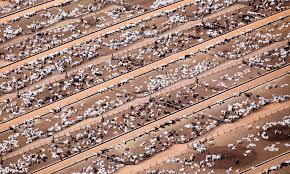 (large scale industrial livestock farm)
(large scale industrial livestock farm)
The environmental impact of industrial livestock raising is huge. It is the second largest contributor to greenhouse gases behind energy production. Without changes in how we produce meat, the amount of greenhouse gas emitted through industrial livestock raising will only increase. The population is rising and becoming more affluent. More affluent populations tend to eat more meat. This makes the problem of finding an alternative even more pressing. Livestock release a huge amount of co2, nitrous oxide, and methane into the environment. These are three harmful greenhouse gases. In addition to this, industrial farming requires the production of mass-produced crops which need large amounts of fertilizer, herbicide, and pesticide, all of which are produced for industrial farms by using fossil fuels. Additionally, industrial farms can damage freshwater supplies because of the large amounts of concentrated animal waste that come out of them. Industrial farms have other negative attributes as well. Industrial farms are breeding grounds for disease and bacteria. These diseases in many cases can be spread to humans. To control these diseases large amounts of antibiotics are used on animals which can increase resistance in animals and humans who consume the food products. If we are to limit our reliance on industrial farming sustainable farming practices and meat substitutes should be promoted. Sustainable farming practices reduce greatly the amount of greenhouse gases that are released, and rely much less on fossil fuels. Vegetarian meat products and cultured meat can also replace traditionally raised meat reducing the need for industrial farms. These are two necessary steps we must take if we want to protect our planet from the harms of global warming.
image citation:
Be Green • Gaia Peace Collective. (n.d.). Retrieved from https://gaiapeacecollective.com/be-green/
